FILM REVIEWS:
AMOUR APOCALYPSE (Peak Everything) (Canada 2025) **
Directed by Anne Emond
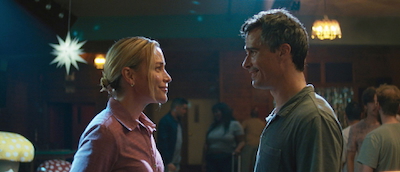

Director Anne Emond tackles male trauma with her forty-year-old protagonist suffering from insecurity and a need for acceptance. Despite his regimen of exercise and antidepressants, Adam (Hivon), proprietor of a Quebec kennel, cannot help but despair over the ever-escalating climate catastrophe. One night, while feeling especially hopeless, he calls the tech support line for his newly acquired therapeutic desk lamp, believing it to be a crisis help line. He gets lucky: on the other end is Tina (Perabo), who's relieved to talk about something more meaningful than assembly instructions. This is a romantic comedy tackled with nuances and from a different angle. But Director Emond’s pace is too slow to match the premise. The pair connect over their shared existential worries and, when an earthquake rocks Tina's Ontario town, Adam takes the opportunity to drive there and help this woman he's never seen. Environmental dread brought these two together on the phone, so it's only fitting that a natural disaster prompts them to meet. This sets the couple off on a path of romance and adventure.
The film is a strange love story of sorts. Director Emond gets her character, Adam, to cry, mope, and come to terms with himself. Her female characters, those that Adam encounters, like Tina and his kennel helper, have stronger personalities. It is hard to identify with a protagonist with self-worth issues, but the film feels too like one with too much of a female slant.
AMOUR APOCALYPSE (Peak Everything) premiered at Cannes this year, followed by a screening at the Toronto International Film Festival. It opens this week in theatres.
Trailer:
ELEANOR THE GREAT (USA 2025) ***
Directed by Scarlett Johansson
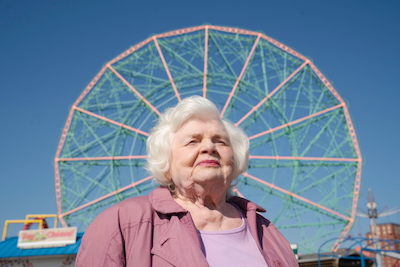
Scarlett Johansson makes her directorial debut with ELEANOR THE GREAT, a comedy/drama starring June Squibb as the 94-year-old named Eleanor, who relocates from Florida to Manhattan after a devastating loss of her best friend, Bessie (Rita Zohar), and roommate of over a decade, only to discover how hard it is to make new friends… until she tells a tale that takes on a dangerous life of its own.
Eleanor hopes to reconnect with her family in Manhattan. Instead, she finds herself living with a daughter (Jessica Hecht) who thinks her mother should be in a retirement home, and a grandson (Will Price) who loves his grandmother but is busy with his own friends. Eleanor now feels adrift and invisible. Squibb portrays Eleanor initially as bitter with lots of snide remarks, but her barrier to friendship gradually and eventually breaks down.
Things get worse after helping another senior with her stuck zipper; she is given a compliment. "You are very kind. We have to look out for each other.”
During a visit to the Manhattan Jewish Community Center, Eleanor stumbles her way into a support group for Holocaust survivors and, joining their circle, begins to tell her own story. “Come on. The first time is always the hardest.” Eleanor is encouraged by her first friend she meets in Manhattan. Except, unbeknownst to everyone listening, it isn't Eleanor’s story — it’s Bessie’s. The story snares the attention of journalism student Nina (Erin Kellyman), who wants to feature Eleanor in an article. Never one to turn away attention, Eleanor begins to forge a close bond with Nina. But how long will it take before the truth shatters that bond? What happens then will not be released as a spoiler, but needs to be seen for the film to be appreciated.
The film has two key issues as its theme. One is the subject of the resilience of one in old age, an issue actress June Squibb has dealt with many times, as in her last films (THELMA), and the other is the Jewish religion leaning towards the holocaust.
The film contains a few prized and sensitive moments. One is the rendering of the Stephen Sondheim song: “I am still Here”, crooned by a senior, after which she shrugs in disbelief.
It is of interest to note that the reason director Johansson and actress Squibb were attracted to the subject of Jews and the holocaust survivors. Squibb is one who’s converted to Judaism, and American-born actress/director Johansson (her father worked as an architect in Copenhagen, though her grandfather was Swedish) has Jewish roots on her mother’s side, with the surname of Schlamberg, her mother’s family fleeing Poland and Russia.
ELEANOR THE GREAT is not a great film and holds few surprises, but it is a decent, well-intentioned cautionary tale by Squibb and Johansson that should entertain while providing a lesson or two.
ELEANOR THE GREAT premiered in Un Certain Regard at Cannes 2025, followed by a debut at the Toronto International Film Festival a fortnight ago, and opens in theatres September 26th.
Trailer:
ONE BATTLE AFTER ANOTHER (USA 2025) ****
Directed by Paul Thomas Anderson
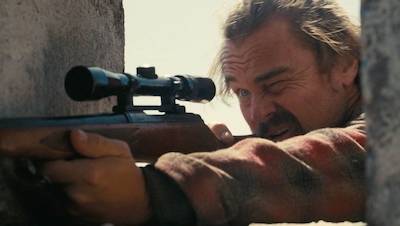
The film comes right on with today’s headlines of immigrant and alien workers in the United States. The story takes the Mexican worker problem to a different level, with established networks functioning in the United States.
The main character is Bob Ferguson (played by Leonardo DiCaprio), who used to be part of a radical revolutionary group. The film opens with him and his activities, including dealing with his enemy, Mr. Lockjaw (Sean Penn), and his girl (Regina Hall). Now Bob lives off-grid with his daughter, in a state of paranoia, trying to avoid his past. But the reemergence of the enemy forces him into action.
The film is loosely based on Thomas Pynchon's novel Vineland (1990), which director Anderson developed for years before pre-production began on the film. But having trouble, he set aside the idea of an adaptation and wrote a series of separate stories. One Battle After Another emerged as a combination of those independent stories with some elements of Vineland, particularly the father-daughter dynamic. It should be noted that the film, as a result, is quite different from the novel. Even the names of the characters are changed. Which is better is up for debate, but the general story in the film is consistent with the series of unfolding events that are more suited to an action thriller. The main plot of the film is the kidnapping and rescue of Bob’s daughter while covering issues such as the aftermath of the idealism of what happens to revolutionaries or radicals when the movements fade, when the social momentum diminishes. How do they survive, change, betray, or get compromised?
Director Anderson has proved himself apt at genres such as satire, black humour, and drama, all of which are blended into this action thriller. The action sequences are fast-paced, examples being the raid of immigrant workers and the car chase at the end, with some amazing camerawork on display. This is that rare action thriller in which the hero is not a super fighter. The visuals and pacing are also energetic, with cinematography by both Anderson and Michael Bauman.
The film is anchored by a central, award-winning performance by Academy Award Winner Leonardo DiCaprio. Other performances are also top-notch notch especially Sean Penn’s and Regina Hall’s. right down to a one-minute memorable one by an unknown no-binary.
This is one film that, though totally engrossing from start to finish, should be watched on the big screen, on IMAX if possible. Watching the film streaming, for example, will allow the audience to take breaks, thus compromising the momentum of the otherwise fast-paced movie. The film opens in theatres in different formats, including iMAX, on September 26th, 2025. One of P.T. Anderson’s best, showing his versatility in the making of this fast-paced action thriller.
Anderson’s highest-grossing film, the 2007 THERE WILL BE BLOOD, grossed $77 million, so the success of this 162-minute, $140 million costing film hinges on the drawing power of Leonardo DiCaprio. It is Anderson’s first film in IMAX.
Trailer:
PLAINCLOTHES (USA 2025) **½
Directed by Carmen Emmi
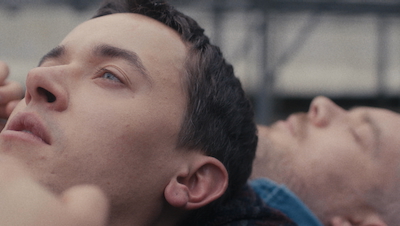
PLAINCLOTHES refers to Lucas, the film’s protagonist, who has the job of a plainclothes police officer. His assignment is morally troubling to him as he works on operations to entrap and arrest gay men, acting as bait in public bathrooms. The film is set in the 1990s, when a lot of these operations were done.
No surprise that Lucas is closeted himself. His identity is in conflict with his work and what society around him expects, which provides for some drama in the film. During one of the assignments, he meets an older man, Andrew, one of his intended targets, and develops a romantic/sexual attraction that challenges the boundaries of his assignment and forces him to reckon with his feelings, his duty, and the risk of exposure.
The film is told in 3 segments, all intercut with each other. The segments are: Lucas at work; Lucas at his mother’s New Year's Eve party, and the encounter between Lucas and Andrew.
Director Emmi, for his first feature, tries hard to create an edgy film but fails. Emmi includes three intercut story segments, which results in a disjointed narrative in which the suspense that has been built up is suddenly abrupt. His use of jarring images amidst handheld cameras is also more annoying than artful. Lucas’s facial hair in the New Year’s Eve party scene is at least, to help sort, which segment is on the screen, as it can get confusing to the audience which segment is going on.
Director Emmi builds up good suspense, especially in the scenes where Lucas is working undercover.
Other than the premise of the plainclothes Lucas entrapping gay men in the toilets, this story serves no new territory. Coming out, family and girlfriend pressures, first sexual encounter, persecution of gays in toilets in the 90’s, secrecy, shame, leading of a double life are all issues that have been worked on before, in other films.
PLAINCLOTHES opens at the TIFF Lightbox on Friday, September 26th.
SUSPENDED TIME (HORS DU TEMPS) (France 2024) **1/2
Directed by Olivier Assayas

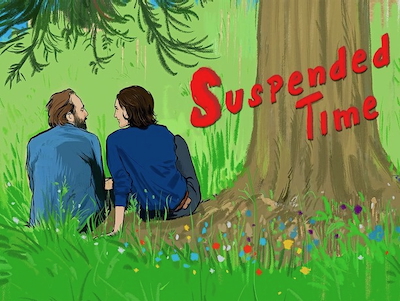
The film SUSPENDED TIME is so called as it is as if time stood still during the lockdown of the COVID-19 Pandemic. The film is set during the April 2020 lockdown. It follows two brothers, Paul (a film director) and Etienne (a music journalist), who are confined together in their childhood home in the French countryside. They’re joined by their respective romantic partners, Morgane and Carole. The old house is large, its rooms, objects, and the surrounding landscape trigger memories and reflections: of parents, neighbours, absences, childhood, past relations, much of which is revealed through the film’s voiceover.
As society recedes in the spring of 2020, film director Paul Berger (Vincent Macaigne) returns to his childhood home in the provincial Chevreuse Valley. Still processing the legacy of his parents and feeling out the uncertain shape of the world to come, Paul hunkers down with his documentary filmmaker girlfriend Carole (Nora Hamzawi), his music journalist brother Etienne (Micha Lescot), and Etienne’s new girlfriend Morgan (Nine d’Urso). Squabbling over the minutiae of health protocols and the morality of a hermetic lifestyle mediated by ubiquitous online shopping, the makeshift household finds new ways to lacerate familiar wounds.
Yet Paul also finds a surprising refuge in the compulsory quietude of pandemic life, an opportunity to reconnect with the books and art and enchanted forests of his youth. A scabrous French comedy from master filmmaker Olivier Assayas, Suspended Time is a sharply personal and fiercely neurotic ode to the eternal expanse of memory and the allure of life beyond our personal screens.
Though SUSPENDED TIME attempts to project what it would be like to isolate during the Pandemic, what transpires on screen is not what the general public would go through. In the film, the two brothers and their respective partners stay in a beautiful countryside house and experience the beauty of the outside. They undoubtedly isolate, but the isolation feels more like a secluded holiday than any imprisonment due to COVID-19. Another point is that the filmmaker and the journalist talk a lot about art and their experiences, which are way above those of many of the audience. In the evening scene, when they play a tune to be identified or the film the tune was taken from, much of what is played cannot be recognized by the average moviegoer.
The two brothers, Paul and Etienne, get on each other’s nerves, which results in one shouting match. Paul is more annoying, and watching these two on film can require a bit of patience.
Yet Assayas’s film is not without charm. Though nothing much happens, and the nuances of the characters begin to bother each other, for example, the volume of the music or what they want to do, like read or watch a movie, there are cute observations where one can laugh at the follies of humans.
The film contains lots of voiceover that gives the audience more perspective of what is going on and how the characters react and feel. The tactic was used very much in Francois Truffaut’s DEUX ANGLAISES ET LE CONTINENT and this film feels like Truffaut’s classic.
SUSPENDED TIME opened only in the United States recently and will premiere in Canada, being available on Digital September 30th.
Trailer:





Comments powered by CComment